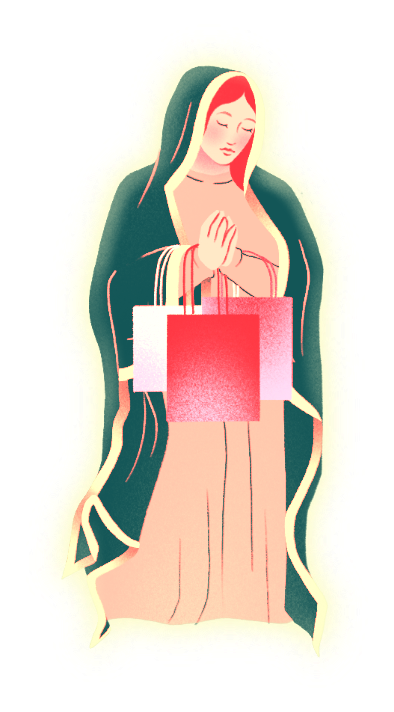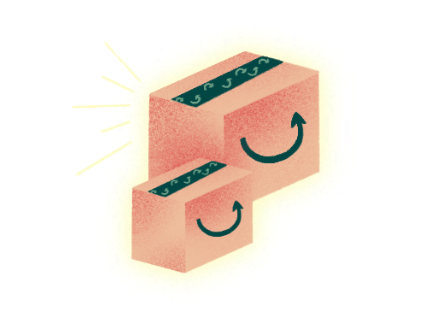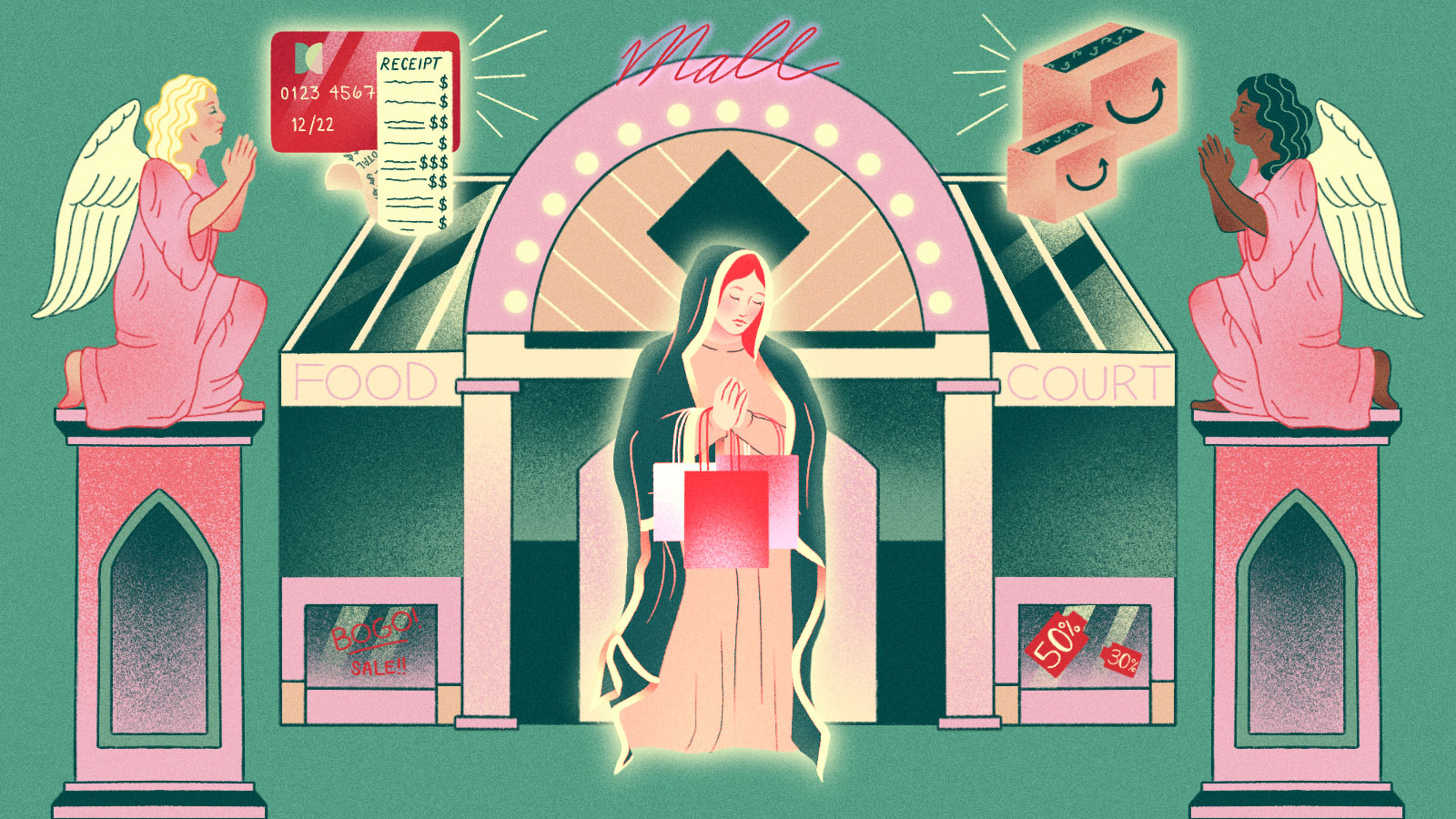This article is part of the Ask Umbra 2021 Holiday Makeover.
We are nearing the two-year mark for a pandemic that has (at the very least) completely upended our lives in many, many ways. Daily schedules collapsed and were rebuilt, values and priorities shifted, personal relationships transformed. And yet, for some reason, the majority of us are not yet willing to look squarely at the holidays and think: Perhaps a Black Friday sale does not add meaning to my life.
The consulting firm Deloitte reports that 73 percent of retail executives expect higher spending this holiday season as compared to last, bringing the per-shopper average right back up to its 2019 fighting weight of almost $1,500. But as we know, many of those purchases will sooner or later (often sooner) end up in some dusty closet, donation pile, or trash bin. When you consider the amount of resources — water, land, carbon emissions — and underpaid, exploited human labor that go into goods that are often simply landfill-bound, it is hard not to be horrified.
And for what? In many cases, holiday buying habits are driven by a need to meet imagined expectations, an attempt to bring happiness to loved ones. While giving and receiving gifts can impart delight and even temporary joy, overbuying for the sake of obligation can also cause emotional and financial distress.
American consumerism is a year-round thing, but things really go into overdrive in the weeks between Thanksgiving and Christmas. When you get into the question of whether these habits are more grounded in religion or tradition, you risk getting stuck in a real quagmire. But for the sake of argument, let’s say that winter gift-giving, be it for Christmas or Hanukkah or Diwali, is a form of religious expression. But that doesn’t mean that we have a spiritual mandate to make a pilgrimage to Target. And you don’t have to take my word for it — in the Western world you don’t get much more influential in religious authority than the Pope, and the Supreme Pontiff has some firm thoughts on the matter.
In the Laudato Si, Pope Francis’ 2015 essay on our moral obligations with regard to climate change, he wrote: “The pace of consumption, waste, and environmental change has so stretched the planet’s capacity that our contemporary lifestyle, unsustainable as it is, can only precipitate catastrophes, such as those which even now periodically occur in different areas of the world.” (Let’s put aside the irony of this coming from the Catholic Church, an institution rather historically notorious for corruption and hoarding of wealth. When the Pope is right, he’s right.)
And yet, taking the “consume” out of Christmas is far easier said than done. We’re up against some powerful forces, including many billions of dollars in corporate advertising and a strong American cultural compulsion to shower our loved ones with gifts.
So how do we actually do it? Well, we start with the foundation, and work our way up.
The idea of consumerism as a form of contemporary religion — “America’s religion,” if you will — is not particularly new. The theory goes that we assert identity through which possessions we buy, define ourselves by affinity to various brands, and make our life’s purpose about having a lucrative enough career to buy what we want. The mall is our church, the credit card our rosary, et cetera.

In the cultural anthropologist Ernest Becker’s 200-page essay, “Escape from Evil,” his final work published posthumously, he explains that the inclination to accumulate possessions comes from an innate desire for security. In ancient societies, the ability to give plenty of gifts both as expressions of generosity and goodwill to community members and as offerings to the gods established the gift-giver in a position of power and respect.
“The origin of human drivenness,” he wrote, “is religious because man experiences creatureliness; the amassing of a surplus, then, goes to the very heart of human motivation, the urge to stand out as a hero, to transcend the limitations of the human condition and achieve victory over impotence and finitude.”
So there, you have a sort of psycho-evolutionary motive, wherein “I shop, therefore I am” takes on a whole new significance.
But if shopping is supposed to be a strategy to triumph over the threat of sad, solitary existence, it’s not a very effective one. Study after survey after story confirms that buying great heaping mounds of stuff does not actually improve our existence in the long term. Economists are developing new ways of measuring what makes a society satisfied with life, because wealth and the ability to purchase possessions (beyond the trappings of a certain level of needs-meeting comfort) are no longer considered particularly meaningful metrics of it.
Materialistic values have been tied to depression, anxiety, and insecurity. We’re even willing to spend money on methods to get us to stop buying so much stuff! Japanese decluttering scion Marie Kondo, for example, built an entire wildly profitable enterprise off of the ways in which the great oppressive weight of our belongings make us actively unhappy — an enterprise, it should be noted, that now includes a store where you can buy more stuff.
When you live in a consumerist society, it is not particularly easy to avoid consumption when you are simply trying to enjoy yourself. Even the most basic features of many interpersonal relationships are to some extent dependent on it. If you want to ask someone on a date, you’ll probably go to a restaurant or a bar or a movie theater; if you’re a teenager who wants a place to go to with your friends, you’ll go hang out at some sort of commercial center; if you want to show someone you care for them, you buy them presents at Christmas. If you don’t do any of these, you will be operating outside the norm, and risking rejection of your peers.

A litany of philosophers and sociologists and psychologists have argued that this hamster-wheel model of self-satisfaction is an (albeit poor) substitute for personal fulfillment and happiness. The Swedish sociologist Magnus Böstrom writes, “consumer culture is often said to be built on the experience of satisfaction as transitory. It fosters a sense that demands are insatiable.” And the psychologist John Schumaker warned at length about the “insanity” that that culture propagates, coming to the conclusion that it “results in an emotional void that is experienced as failure because of the persistence of emptiness that mocks all attempts at satisfaction.”
In other words, giving up consumerism means taking up the hard question of, what truly makes us happy? Before we can find that answer, we have to do a fair bit of deprogramming. Which takes us to another specter of Yuletide torment: Capitalism.
In the bone-biting chill of Scottish November, Reverend Billy, the leading “preacher” of the Church of Stop Shopping, brought his congregational choir to have their voices heard at the COP26 climate conference in Glasgow. The group is not actually a religious one. Rather, they are an anti-consumerist performance troupe whose singing and dancing routines urge their audience to consider changing their heavily polluting ways. By, for example, stopping shopping — or at least doing it way less.
But circling the Scottish Event Campus, the venue for COP26, the choir members found they just couldn’t get an audience with the actual delegates. The conference itself was housed in “these big buildings that all have different shapes — it’s just kind of a postmodern hell, that architecture,” Reverend Billy — government name William Talen — told me over the phone after the fact. There were highways and waterways and other forms of confounding infrastructural blockades that all conspired to form a sort of labyrinth around the conference center, and the group, at several points, found themselves stymied.
“Postmodern hell” is a familiar setting for the Church of Stop Shopping. Reverend Billy has spent the past two decades leading the group in protesting environmental sins in a wide variety of venues: Times Square, multiple outposts of Starbucks and Walmart, the Mall of America, and, more recently, the JP Morgan Chase Bank headquarters in New York.
The structures that protect and nurture the urge to shop are mighty fortresses indeed. Zygmunt Bauman, a famous Polish sociologist, wrote that one reason we’re so trapped in a consumerist cycle is because leisure — the ostensible goal of wealth — has become both commodified and profitable, making it “the turn of the consumers, rather than producers, to be exploited.” In other words, your boredom or malaise is someone else’s opportunity for profit.
The entire purpose of a capitalist system is to build and accumulate assets (aka capital), and the American experiment has definitely succeeded in that regard. Today, we have many very profitable corporations and wealthy individuals with a vested interest in maintaining our cultural obsession with buying and owning more and more stuff.
But to be able to participate in said stuff-owning, you have to have money. If you don’t have enough money to buy all the things you want, you are actively encouraged by companies and financial institutions to take out lines of credit and go into interest-accumulating debt. The psychological, physical, and economic impacts of significant debt — particularly on low-income families — are well-documented, and they are profoundly negative: heart attacks, chronic pain, homelessness, to name a few.
While there’s no doubt that the choices of individuals help perpetuate an unsustainable cycle of consumption, it would be as profoundly off-mark to criticize those with limited means for our consumerist nightmare as it is to criticize them for the climate crisis. The impact of what the bottom 10 percent consumes so massively pales in comparison to that of the top 10 percent, as an analysis by the Financial Times recently found. (That differential is greater in the United States than in any other country.) But our lifestyle options are not limited to “impoverished and struggling” and “in possession of a personal jet.” There are ample examples of middle-class and even wealthy families who have enough money to be comfortable but still feel trapped in an ever-more-stressful cycle of debt and spending.
“What I argue is that the United States is like a backpacker, but a backpacker who has this enormous pack, overloaded, falling backward, angry, straps are cutting into us, like an overturned turtle that can’t right itself, and we’re mad as hell,” says the documentarian John de Graaf, who has researched consumerist culture for decades. “And we are blaming everything — immigrants, women, taxes, government, minorities — for this misery that we feel, instead of looking at the crazy priorities that get us there.”

But what would an alternative to those crazy (work-obsessed, wealth-obsessed, environmentally apathetic at best) priorities look like? Perhaps a level of social infrastructure that allows people to actually enjoy their lives. Say, a four-day work week, government-ordained paid time off, or subsidized child care. Quality over quantity, so to speak.
To that end, there is a contingent of escapist Americans who like to point to Scandinavian countries and say: See, they’ve got it figured out. They have year-long paid parental leave, they can nestle their babies in a government-provided box of free onesies. Surely their priorities are in the right place.
“That’s bullshit,” says the sociologist Magnus Böstrom. Despite the fact that many Nordic countries have comparatively extensive welfare benefits, “the income gap is drastically widening in Sweden, and there’s all sorts of mass consumerist behavior. There is no real policy and politics and culture in Sweden to downsize.”
But Böstrom has been researching — in Sweden — why and how people do decide to downsize, and what happens when they do. The “why” is usually driven by a dissatisfaction with life combined with distress about the ecological impacts of consumption, the “how” usually entails working less to have more free time, and the “what happens” is, surprise, a greater satisfaction with life.
“I think too few people ask these questions: What do I do with my life? What is well-being, actually? Is it just to continue as usual and follow the norms — is this a meaningful life?” he says. “So that has similarities, of course, with religious thoughts — that they reflect on their existence.”
Philosophy is well and good, but let’s bring this holiday conversation back to the ghost of consumerism present — and by that I mean the presents themselves. This time of year is associated with peak capitulation to our American-capitalist grooming, but it’s also an opportunity to reconnect with our values and reinvent traditions for a new generation.
April Dickinson, who documents her dogged attempts at a minimal-buying, zero-waste lifestyle on Instagram, explained that her bicultural upbringing helped inform her current approach to holiday giving. On her Chinese mother’s side, there were no objects bestowed on many celebratory occasions, just money and delicious food. On her white American father’s side, big piles of gifts at Christmas were the norm. As she and her brother grew older, they realized that, in either case, the memories of how they spent the time with family were far more vivid than their recollections of what they had actually received. Later, Dickinson saw the same long-term indifference toward physical presents play out with her own young children.
“Kids really love and are excited about a toy for like two minutes, and then they’re kind of over it,” she said. “Seeing that happen in real time, in front of my eyes, I was like: ‘We need to adjust why we’re doing this.’”
Dickinson found that pushing back against the great weight of materialism worked best as a process of slow reduction for her family: gradually smaller and tighter wishlists, and open communication with relatives about what really matters to her. But for others making the attempt, she emphasized the importance of not being too harsh on yourself. “We only have so much capacity to always be upholding something, and swimming upstream is very, very exhausting. So, give yourself some grace, and just commit to what you’re able to commit to.”
Part of that commitment problem is that a non-consumerist Christmas — to say nothing of a non-consumerist America! — is still so hard to imagine. Even writing this essay, I myself struggled to imagine what a life with less stuff would look like on a society-wide level. I found myself coming back to the words of Michi Saagiig Nishnaabeg writer Leanne Betasamosake Simpson, who wrote in her novel Noopiming: The Cure for White Ladies, that the white architects of this country and its institutions “have really structured the fucked-up-ed-ness in a seemingly impenetrable way.” That certainly resonates when you try to do something as ostensibly simple as eschew or even reduce gifts at the holidays.
But if there’s a silver lining to our buying habit’s sticking power, it’s that it actually speaks to our primal desire and potential for change. In an analysis of the very idea of the religious trappings of materialism, Finnish theologian Mikko Kuhrenlati wrote that the “absolute act of dreaming can be interpreted as the engine of consumerism,” a kind of beautiful bit of optimism. We are shopping to achieve some imagined better life or version of ourselves that will be achievable with this car or that lipstick.
What comes next, I suppose, is pushing that imagining of a good life beyond coveting what we can see in a store window or Instagram ad. Is this season not known for miracles?



